Belief: a communal power that circulates through love
It is hard to know which one came first: belief in poetry or belief in poets. I am not so sure the beginning is important.
September 2023:
I am visiting San Francisco for a somatic arts retreat. On this particular trip, I am staying with a few poets, Jamie and V, who I adore deeply and have not encountered since their last tour in 2018 when they stayed with Rye and myself in Kansas City, Missouri. Rye, my former roommate slash best friend slash fellow poet, travels in from a different part of California for the occasion. 2018 is not our first encounter, however. Nearly a decade before 2023, Jamie tours through Texas and features at an open mic I am running outside of Houston, Texas. She reads humorous and endearing poems outside in the heat, and I can’t believe such collaborative magic as this exists.
Now (which is no longer a now, but still somehow an ever-occurring occasion of nowness through this remembering), we are in California, all together. We spend the weekend watching Bring It On and David Bowie’s Labyrinth with their dearest dog June. We eat figs in a park, and I am fairly certain this is the first fig I have ever eaten. The fruit is divine. Especially in the sunlight. Especially shared amongst the silent comfort of friends. We do not mention writing or current projects or future projects or poems we’ve read recently. There is no need to. We go thrifting, and Jamie buys me a cupcake for my birthday. The flavor escapes me now, but the color is pink, and this is important. On my last night, the eve of my birthday, we giggle in a lesbian bar, intoxicated, drinking sodas and watching the absurd graphics projected onto the wall behind us. It is all very ordinary. It is all very magical. It is ten years in the making. The 2014 year old me is still, somehow, here and also not here, just as much as the 2023 year old me is now and not now. Perhaps, in this in-between of time and becoming and presentness, poems and writing emerge, recording and documenting it all. We are the assemblage of poems we have read and shared and forgot to remember to read.
__________________________
i point out all the places i’ve cried since august almost proud, you say that you can relate and i believe you. that you must have needed to cry for months but couldn’t. it took being hit by a careless driver last weekend to knock the salt out of you. wow. i guess this is what it’s like to exist. things like that can feel so perfectly horrible and so stupidly necessary.
— jamie mortara, “bagel city”[1]
______________________________________________________
A poem is a gesture of pointing.
Pointing is a communal gesture.
We point; we get close to one another; we find the same site line; we look again; we squint; we find our own site line, once more, and invite the other closer to our own gaze. Closer to our own noticings. Closer. Closer, closer.
This pointing is always misaligned, inaccurate, at best, but the communal sharing of looking, of noticing, is important.
A poem is a gesture of pointing:
Look here! Do you see this! This cherry stem! This earthquake! This! This! This too!
_____________________________
September 2013:
I have been attending a weekly poetry open mic in Bryan, Texas, called Mic Check Poetry for one year. I neither know if I will survive this year nor that this community will be a foundation for this very survival. Through their friendships and late night diner chats when the brain tells us things we know we should not believe, this community offers a lifeline through their own extension of honest survival. It isn’t anything about the place itself, but the conglomeration of what is and can happen when poetry and poems and people all collide in honest question-asking. In earnest renewal. In us believing in our mutual survival through, a rooting occurs alongside the other that is unlanguagable, or perhaps simply we can call it a beginning, a breath, a start to a sentence.
Bill* and Safi approach me, asking me to run Mic Check Poetry and subsequently our poetry festival, Texas Grand Slam. “I am sorry, what? Absolutely not.”
I could not say yes. How could I? This community means too much to me. I will fuck up and I refuse an attempt at the attempt. I am without a doubt! not a good! (enough) poet! I am not nearly a strong enough! writer! I have never done something like this before. How can I run a community? How could I say yes to myself holding a thing as true to me as community? as poetry?
But they know I can.
They believe I can.
They find language in me that I yet cannot read.
Eventually, their belief in me points me towards a becoming.
In January, 2014, I say, “Yes. Okay. I’ll give it a try.”
*Bill’s first full length manuscript Oh God Get Out Get Out (2017) is printed with Write Bloody, who I will go on to work for in 2015.
________________________________
The root word of belief is “to love.”
My belief, my love, my desire in what poetry does in me keeps me writing. My belief in what I’ve seen poetry do in and to my friends and my communities keeps me writing. And then, when I can’t write anymore, when I think I have exhausted language completely, my fellow poets, my closest friends, remind me that poetry is a language that my body knows most deeply. It is this endless cycle of belief, of love, of desire and dreams written into language that feed all of these spaces: spaces of dreaming, spaces of creating, spaces of communing.
____________________________________
February 2011:
My freshman year of college, I am exhausted and lonely and sad in the way that your early years away from home are quietly terrible, in the way no one really warns you they might be, in the way nothing is really matching with what you pictured being an “adult” might entail, and I wonder about the state of aloneness held within my longing.
I am walking back to my dorm, in tears, having left a party early, when I pass by a sign that says “Poetry Reading, Free.” The reading features Anis and Derrick. I am immediately enamored. I have never seen poems read live. The evening cradles the isolation inside my chest that I thought to be beyond reach. Joy and grief are held in the same hand through their words. There is a world that is being built before me that my body knows deeply, that I have felt in the small tender touches of belonging, that I know to be truer than what my reality might call truth. The magical itch of, No, no. I believe there is more. My belief tells me there’s more. I wouldn’t be in so much ( ( isolated ) ) grief otherwise. Yet, these poems tell me they are not so isolated. These poems tell me that I can keep going. And I do.
I find myself sitting on a bus
watching this small boy float down like fresh water,
carrying a book I used to carry,
asking if I want to share what he sees —
if only for a little while, and I do.
…
[he] starts reading me the sentences himself,
his hands dancing back and forth, stumbling
over words, not noticing
all the time
what is written,
sometimes skipping whole lines
because his fingers are moving
faster than what they are showing his eyes
and I want to tell him to slow down, Quentin.
Slow down, Quentin.
You don’t have to touch and go.
You can see it all if your finger whispers on one word.
Slow down, and hold what you see just a little while longer.”
– Anis Mojgani, “For Those Who Can Still Ride an Airplane For the First Time”[2]
Later this night, I google Anis’s name to learn more about him, his work, his books, all printed through Write Bloody Publishing, founded by Derrick, based (at the time) an hour from me in Austin, Texas.
“Maybe one day I could work for them.”
(And I do.)
______________________________
May 2020:
A poet friend, who I am no longer able to locate in my memory in that particular way that names disappear and faces change, tags me in Chen Chen’s post on Twitter with “Thought of you!”
“Thought of you!” might as well be a bouquet of roses.
“Thought of you!” might as well be a bag of Hot Cheetos delivered on your doorstep.
“Thought of you!” might as well be a sweaty hug, a kiss on the cheek.
I am not familiar with Chen Chen’s writings, but I become familiar. The bountiful use of language! The playful queerness of expansion! The joyful amens that unfold before the heart! How I see the permission for the unfolding of my own playful, queer expansion.
So, while I am here,
I would like to look at every flower. & every painting
of a flower, every flower in a photograph. Every amateur’s
crappy gorgeous sappy
good drawing of a flower. Every philosopher’s
completely uncomplicated
memory of a flower, yep that one
flower that was just a halfway decent dandelion
or something, but the sudden recollection of it compels
even the most fervent Hegelian to say
Bye bye Hegel, see you never! & then
a little later, chat him up
soul to soul in the shimmery aftermath
if ever there was one, & I would like to believe there is
— Chen Chen, “For Whom It May Delight”[3]
________________________________
Everything I know, I know because I have been in relationships.
Everything I see, I see because a friend pointed me towards a knowing and a becoming. Everything I love, I love because a friend loved me.
Everything I know, I know because someone loved me.
Everything, everything, everything, a
A _____________
A becoming. A belief. A poem. A becoming.
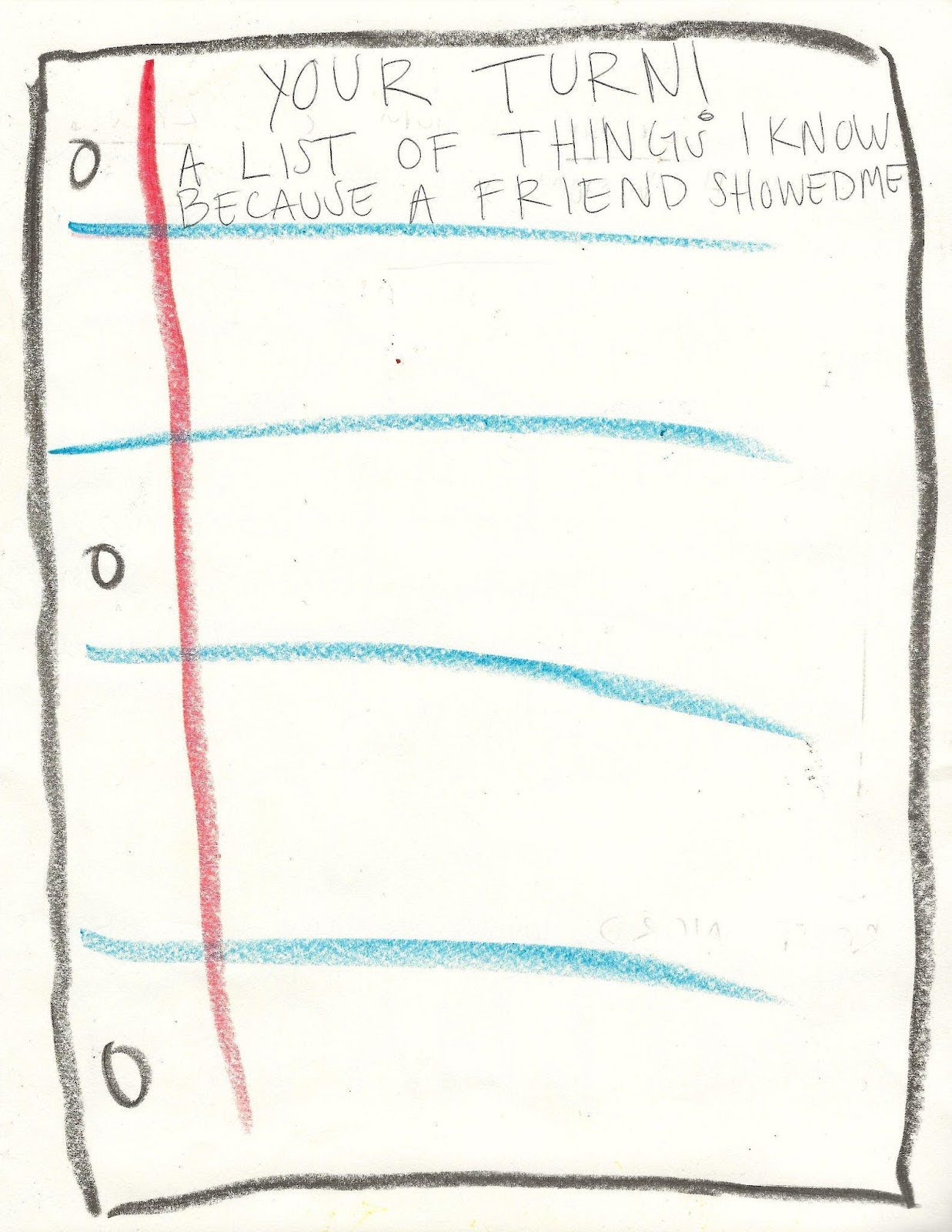
Madison Mae Parker: Befriending: friendship as a renewable resource// learning love // art as a process of becoming, a workbook zine, 2023.
_________________________
March 2024:
A poet friend asks if we can chat about some art/poetry/performance logistics. “Absolutely.” She is planning a performance and wants to chat about how to move from a space of poetry into performance. I recall a similar conversation I had in 2016 as I was planning my first one-person show. Ebony told me then, “Find yourself a director. One that you can trust.” I share the same information with Sasha. Sasha and I first meet around 2013 back when we were both competing in poetry slams. It’s been many years since either of us has touched a stage in this manner, many years since we have encountered each other, face to face. Despite this distance, I am continuously excited at the creative extension Sasha exudes in every project she touches.
Sasha hires me to co-edit her performance script, and I am honored at such an ask. (Will I ever stop being giddy at the places poetry finds me orbiting? (I sure hope not. ) The trickles of belonging find me inside every site of encounter centered in and through language.) There is magic in this world to discover. And I am reminded in reading the script, if there is anything Sasha knows how to do, it is how to worldbuild from the ashes around us. She does so in her poetry and will continue to do so in her performances. For this, I am most certain.
“Here and now will be the faded kind of memory like waking from a dream that loosens its grip as we become wider and wider awake. At the grocery store, we will hear someone whistling the old anthem. They will not be able to remember more than “oh say can you…?” Nobody will. Such is the case with ruins, ancient histories, blurry faces everywhere smeared by the fists of their conquerors.”
— Sasha Banks, “uhmareka, post collapse: three”[4]
____________________________
A poem is a gesture of pointing, of looking.
Looking is an act of love.
Saying, “I won’t look away. Not now.”
Saying, “I see it too.”
I’ll look with you. I’ll be in relationship with you. Even if that looking is towards yourself. Even a looking within your own being. Even a looking at a sensation, a feeling, a joy, a grief. You are worthy of your own looking. You are a poem to be looked at and into.
I’ll be in relationship with you. I’ll look alongside you. I’ll look. I’ll look.
Being in relation.
The preposition (in): enclosed or surrounded by.
In relationship to: what this means is:::
I let myself be surrounded by you. I choose to be surrounded by and in and towards your surroundings.
I won’t look away, I won’t.
__________________
August 2017:
I am going on my fourth year of teaching poetry to highschoolers. AP, a recently graduated student of mine, and myself get coffee. I ask her what sort of creative life she desires to cultivate. We explore, together, what it might look like to build this for herself with who we know and what we know, right now. She starts assisting in the afterschool program where we first met. She has already written and taught her own workshops, but starts to take on more responsibility. We workshop workshops. We share poetry prompts. We share poems and poets, podcasts and playlists. Have you read Aziza Barnes? What about Hanif Abdurraqib? Anis Mojgani? We talk about what it means to run a poetry community, what it means to become an adult, what it means to navigate familial loss. We talk about chapbooks and heartbreaks and first dates and first drafts and eventually it’s time for her to make her own book. We will later travel in 2018 for her to compete in Texas Grand Slam with me serving as her coach. She will make the semi-final stage. She will continue to perform on many stages across the country for her poetry.
___________________________________________
A poem is a gesture of pointing, of looking.
Looking as a form of listening.
Listening a way into writing.
Writing, not to understand, but writing to be in relation to meaning.
Meaning, not with a period, but an ellipses (..).
The multiplicity of a period being in relationship to unfolding or otherwise left unsaid. An ellipsis (an ending, an ending, an ending) goes unsaid.
_______________________
July 2023:
I am at a reading at the Chicago Poetry Center to see Jane, who has traveled from Washington, read. I am here with my longtime poetry friend, Angel. Angel and I meet on my first poetry tour in 2015 where I stayed at their house in Colorado. Now, we are both in Chicago, in graduate school. Now, we understand ourselves to be queer in a way we did not yet understand then, with shifting identities and genders and names and fluid expressions. Now, I know this understanding is not a solid form but a porous becoming, inside of friendship, inside of writing.
Jane walks in front of the crowd. She is holding a stack of her books, a metal kitchen bowl, and a pair of clean, shining scissors. Disruption is on the horizon, and my body itches with a knowing of exploratory poems to come. Jane reads a series of poems, both old and new works. Finally, towards the end of her feature, she acknowledges the kitchen bowl and scissors sitting next to her at the microphone stand. She begins to talk about her childhood, growing up in her mother’s kitchen, her mother’s childhood and her mother’s now adult, working life. Tears form as she names her mother is probably at work, even at this late hour, even in her elderly age. Addressing the bowl and scissors again she says something about not fully understanding why she needs to cut vegetables up here, in front of us, while she reads this particular poem, but she knows she needs to. Something about labor and food and who gets to stop working and who gets to enjoy food. And the poem asking for more of all this. Demanding a belief in what the poem might and wants to become. She then reads the poem, “After Preparing the Altar, the Ghosts Feast Feverishly,” as she cuts snap peas with the scissors, tossing them into the bowl. snip snip snip. The snap peas are sharp and fresh and pop under the blade, punctuating the line of each poem.
Jane and I have not met before tonight, but I am familiar with her work. We talk after the show. I mention how I am a somatic educator, a poet, and a performer, considering words coming in and from the body. I mention how excited I was to see her embody her poems in this way, to see the poems take shape off the page, from her mouth, through her hands, with a new form. The gesture of the poem. The gesture of the making. As if to say: Look look look. Here. A poem is happening here! In my cutting. Here! In the snap peas cracking. Here. My body needed to create something more, something new with this language. My body asked to be pointed to too. Here! Will you listen to the poem taking shape beneath my hands? Through this body? Do you believe the body to be a poem too?
We become friends on social media and we have yet to connect beyond the boundaries of what social media most often brings, but I hope that she continues this bodily exploration of looking and yes and pointing. I don’t doubt that poetry circles will continue to morph and shift and expand and come back again and we will encounter each other again.
I now work as a teaching artist with the Chicago Poetry Center.
_______________________________
What if how we think about poems might be a doorway into how we think about friendship, about community? About our interconnected systems of knowledge and knowledge production? Of history making and history keeping? What if my connection to you isn’t as far off as we think? What if how I read a poem, how I edit a poem, might be considered an extension of a relationship? What if how I allow a poem to shift and change in and through my encounter with the text, new each time I read it, might extend to the freshness needed in friendships, alive and awakened to memory?
_______________________________
February 2017:
I find myself needing more expansion inside the poems I am writing. I finally have language around this desire for expansion in my body. I start to wonder if I might be able to write a fifteen minute long poem and what that might look like. Can I challenge myself to such a thing? Suddenly, a two hour poetry script is in my hands. I don’t know what to do with this. Ebony tells me to find a director. I’m fairly new to Kansas City still and don’t have any connections to the theater community nor background in such.
While I am sitting at a coffee shop, applying to the local Fringe Festival, Rye, a new friend who I know through the weekly open mic, Poetic Underground, stops by to see me. Recalling that Rye grew up in KC and has a theater background, I ask if he knows anyone that might direct a one-person poetry play, “Well, I would.” “Great!” I reply with all confidence and agreement in me. I need nothing else. I trust this person because I trust their poems.
She directs Unravel not once, but twice. We become collaborators. Then coworkers. Then roommates. Then neither of these, but still in deep connection all the same. We move states apart from one another and watch each other blossom and root into ourselves, into our creativity. I am not me of now without the unfolding of conversations, of rituals and spells, of laughter and witnessing, of sharing of writing (often without sharing writing at all) that has been held within this friendship.
The sun is coming up and I’m still dreaming
I dream of a priestess erotically baptizing me in pink wine
of a crane pulling a car out of a pond on my future farm
of all my former lovers wearing each other’s necklaces
In my waking dream I am a skilled architect of my life,
stacks and stacks of blueprints never built
— Rye Lanae Boothe, “A solstice elegy”[5]
_____________________________________________
My relationship to and with and alongside creativity, alongside writing is just that—a relationship. While pursuing my MFA in performance, a deep feeling of frustration with myself and within my creativity wouldn’t shake me free. All my peers were producing and showing and moving and making things happen and//and//this and//this, and//AND!
It was all beautiful. And yet! And yet! And yet!
In comparison, I felt like I wasn’t. I wasn’t making enough,,,I wasn’t creative [creating] enough. I wasn’t enough I wasn’t, I wasn’t. All of the things our minds tell us when we are living inside of scarcity, inside of imposter syndrome, outside the belief of abundance. Within this mindset, I realized I was viewing creativity as a tool to work for me. If creativity was not “working” aka producing, making work, showing it to other people, having the shows, having the galleries, writing the poems, publishing the words, having//having//having – consuming – what was the point of the tool?
When I got still with myself, I felt the quiet, tender pull of Creativity asking, “But what might I need? How might you be in relationship with me? How might you listen to me more deeply? Trust me more? Tell me things and ask me things? Allow me to respond and show up?”
I suddenly felt this softening towards myself, my “creative blocks” (I don’t believe creative blocks are real, but that’s a different text), and my whole practice. It did not change my output. It did not make me produce or write any more. It did allow me to release tension in my body, to be in flow and service to the work I believe I am here to do. And for me, this has altered so much of my life (not that I remember it always). The belief of what friendships might hold, the magic of becoming before another, the allowance to write out a life for ourselves keeps me present before the pages of my own life.
_________________________________________
Summer 2015:
I drive to Houston, Texas to see Kaycee perform at Write About Now (founded by Safi in 2014). Kaycee and I meet two summers before at Southern Fried Poetry Slam in New Orleans. They are performing a hybrid poetry/theater performance. I am becoming antsy around my relationship with poetry and performance and find my body wanting more. I do not yet have this language, but my body does and will show me with time and patience as I learn to listen more deeply, more closely.
Kaycee performs a 30-minute edition of Body Play, and my whole body is ignited with a curious flame. I believed poems, words could accomplish something as such, but to see a friend I admire access that very belief and manifest it onto the stage, through the body. To have the body be so central in the making of worlds and language and poetry was an itch I did not know could even be scratched at.
__________________________________
I have been constructing various forms of art maps, a creative family tree of sorts, as a way to remember and call forth my own lineages of becoming. These maps will sometimes focus on a particular person, a particular art medium, city, or event or venue. I have used them in my own creative exploration to call in inspiration in my own making, to trace and honor the names history may not be so quick to remember, and to hang them in my studio as a form of honoring and humbling. Through this tangible map-making, I have seen, more than ever before, the poets, the artists that have led me to where I am today and have kept me on the path of making.
From this place of mapping, of lineage tracing, I have been creating Friendship Zines, exploring writing around friendship and community, thinking of the text as a workshop, a workbook, and asking the holder of the zines to map out their own artistic lineage along the way.
Now, you might recognize a name or two from the stories I have shared. This map, perhaps, might mean nothing to you. Perhaps this map is less a map and only lines and names and symbols of people and places that don’t hold much meaning. However I hope that, at the very least, you wonder what your own creative map might look like. Where does your story begin? Who is on the map that you perhaps have forgotten about? The people you may not even speak to anymore, yet still have borne witness to your unfolding. The people who still see your uncovering, unfolding, rewriting, and where does their map intersect with yours? Whose map are you on?
__________________________
November 2022:
I have freshly moved to Chicago to start graduate school. AP asks if we can chat on the phone to process some challenges within the poetry community that she leads back in Kansas City. I say, “Yes, of course.” We catch up. We chat a bit more. She fills me in on what is happening in the community. And my god, how is it possible that she was once a teenager in my classroom? And my god, how was I once so young, leading communities myself? And my god, has it really been eight years since we first met? And my god, how I feel that poetry classroom frozen into place, still carrying all the lessons those students imbued into my being.
As I share my advice, I feel tears well into my eyes. Being about her age when I took over Mic Check Poetry, I realize I am telling her what I wish I could have told the 23 year old me, running an arts community for the first time. That shit is hard. That believing in people and in community makes all your shadows come out. But I believe in her. I believe in her more than I might have ever believed in myself. And I believe in her belief in poetry.
“I’ve gotten into a routine of spending most nights willing my poetry to be.
To be loud.
To be boisterous.
To enter a stage unapologetically.
Or even my room.
Or even my mouth.
…
Is she only artist when someone says that she is?
Is she just?
Just a young and open mouth?
Just busy hands?”
—AP, “is a poet a poet if nobody’s snapping?[6][7]
——–
September 2012:
The first time I read a poem of my own in front of people, I am a junior in undergraduate school. My roommate, D’Ann, takes me to Mic Check Poetry in Downtown Bryan, Texas. We return to this dive bar over and over and over again until she finally forces me to sign up and read something. I have no recollection of what I read (thank god). I am terrified and scared. I show up every Sunday following and read my work every chance I get. I do not yet know the impact the people I meet here will hold for my becoming. I do not yet know the unfolding of self that will occur from these connections. I do not yet know the self that is to come or even the self that is of this now. I only know the longing of language inside myself. And for this, I keep arriving.
________________________________
If I believe in the belief my community has for me, how might that propel me to keep creating? If my relationship to creativity is that—a relationship—is all of life not art unfolding before itself? If I am committed to community, I am committed to creativity. If I am committed to creativity, I am committed to feelings. If I am committed to feelings, I am committed to myself. If I am committed to myself, I am committed to community. An ecological loop of nourished and becoming nourishment, of belief in each other creating belief in ourselves, belief in the work.
_____________________
December 2023:
I am in graduate school getting coffee with a former student, Dia, who is a senior in undergrad at a neighboring university. We are able to chat a bit more informally about our lives these days. She shares about how film school is, what it is like to be a senior in undergrad, plans for post graduation, and how his dating life is. I talk about graduate school, what it is like to return nearly ten years later, and coming to understand your lesbian identity as you enter your thirties. Dia reflects, “I always knew you were a lesbian. It was so evident! I remember asking if you were queer when I was a sophomore. You said, ‘Nope!’ But I knew you’d find out one day.”
___________________________________________
We are always becoming new. We are always discovering ourselves. We are always writing and rewriting our lives and our stories. We are always approaching a new poem, a new body, a new way of thinking and growing. I share all of these stories with you, not to glorify my life or uphold it as something special, but only to highlight the webs of knowings that allowed me to become. To highlight all the times I struggled to believe in myself, but community held a belief I could not access. To excavate all the times I believed in poems and poems allowed me to believe in community, even when I struggled to find it right in front of me. To highlight all the ways poetry has allowed me to believe in the people shapeshifting, editing, and rewriting themselves continually before me.
A becoming. A belief. A poem. A becoming.
___________________
June 2022:
I am packing up my life in Kansas City to move to another state for art, yet again. This time to Chicago, IL to pursue my MFA in performance. The last five years of my poetry and arts career have been deeply focused on the body, embodiment, and language emerging from the body. My first one-person show, Unravel (2017), is a two-hour poetry production exploring the connection between the body, fabric, and the spiritual realms we inhabit through generational lineages, cultural manifestations, and societal belongings. In packing up my many, many, many books, I stumble across Kaycee’s manuscript I bought in summer 2015. I have not spoken to Kaycee in some time, albeit the occasional Instagram comment or such, nor have I thought much about this particular show I witnessed just months before my move to Kansas City later that same year. I hold the text in my hands and I understand the importance of witnessing this show with a nowness that does not make this new knowledge, but a nowness of arriving: the permission of belief in poetry and what it could and wanted to do in my body and the bodies of those around me. I pull out my phone and message Kaycee. “Thank you.”
_____________________
RESOURCES:
- “Continual Becoming with ALOK” on Becoming the People podcast with Prentis Hemphill
- “Joy Is Such A Human Madness: “ Ross Gay’s essay, originally in Book of Delights for On Being
- “What It Takes to Heal” with Prentis Hemphill and adrienne maree brown on Becoming the People podcast
- Hanif Abduraqqib’s Instagram posts on love & friendships
Additional Nodes on Art Lineage Map:
- Franny Choi
- Ayokunle Falomo
- Chris Reeves
- Claire Lobenfeld
- Desiree Dallegiacomo
- Liz Flood
- Impact Festival
- Site Gallery
- Tamalpa Institute
I invite you to create your own artistic lineage map, be it influences, people, or experiences. And if you do, please share it with me via email to celebrate your lineage of becoming alongside you.
[1] Jamie Mortara, “Bagel City” in congratulations you are prequalified for the darkness that consumes us all, zine, first published 2015.
[2] Anis Mojgani, “For Those Who Can Still Ride an Airplane For the First Time” in Songs From Under the River (Los Angeles: Write Bloody Publishing, 2013).
[3] Chen Chen, “For Whom It May Delight,” The Oxonion Review, March 20, 2024, https://oxonianreview.com/articles/to-whom-it-may-delight.
[4] Sasha Banks, “uhmareka, post collapse: three,” The Poetry Project Newsletter 266 (Fall 2021), https://www.poetryproject.org/publications/newsletter/266-fall-2021/welcome-feature/uhmareka-post-collapse-three.
[5] Rye Lanae Boothe (@rye.lanae.boothe), “Sad poet summer / but in a hot way,” Instagram post, June 24, 2024, https://www.instagram.com/p/C8nij6vpcJU/?igsh=MTJkbnhodGQ4cTZjZg%3D%3D.
[6] AP, “Is a Poet a Poet if Nobody’s Snapping?” from Spilling, Write About Now (YouTube channel), April 10, 2019, original performance 2018, https://www.youtube.com/watch?v=MWpDhv5pFIw.
[7] AP, “Is a Poet a Poet if Nobody’s Snapping?” from Spilling, Ghost Poetry Show (YouTube channel), January 14, 2024, original performance 2023, https://www.youtube.com/watch?v=T3oaZ77HxV8.

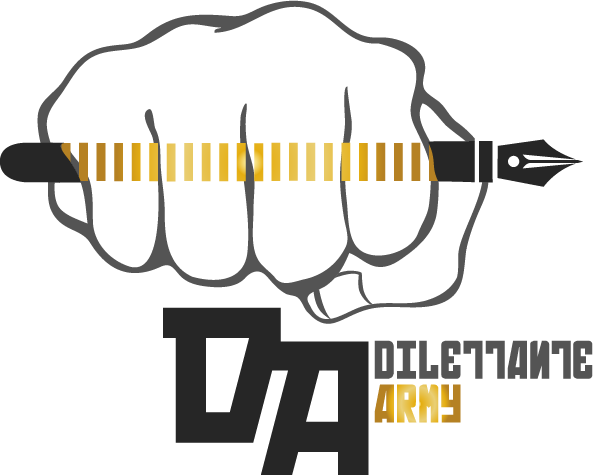
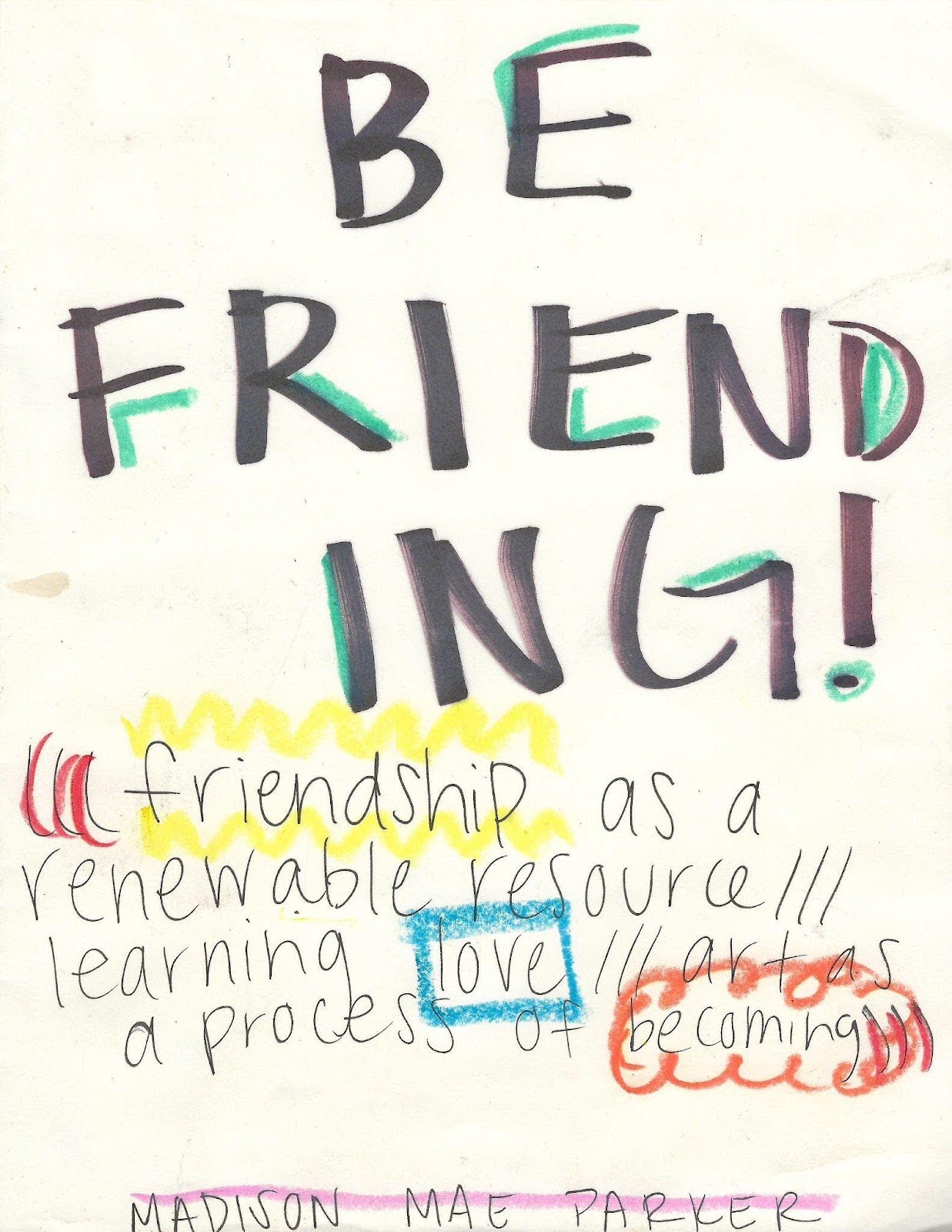
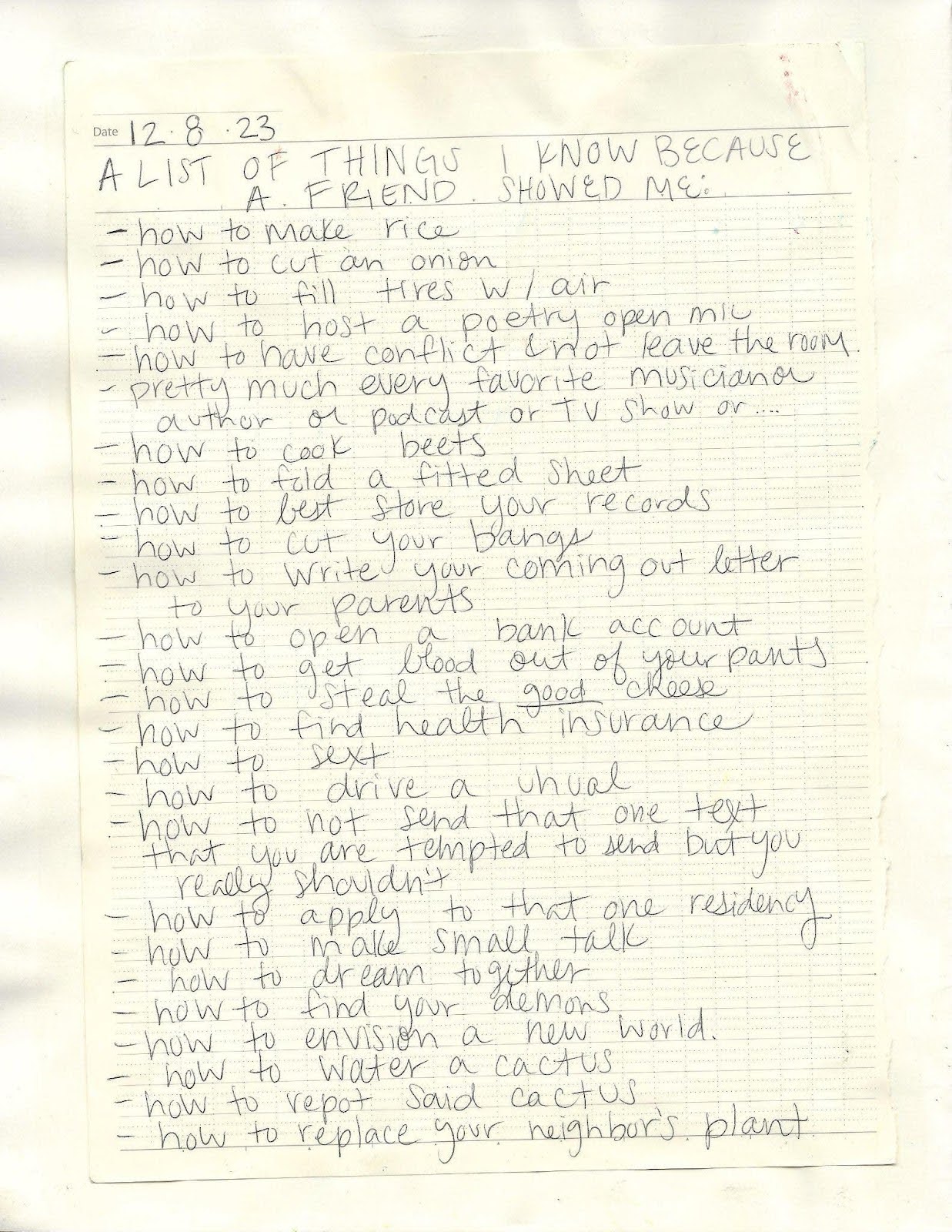
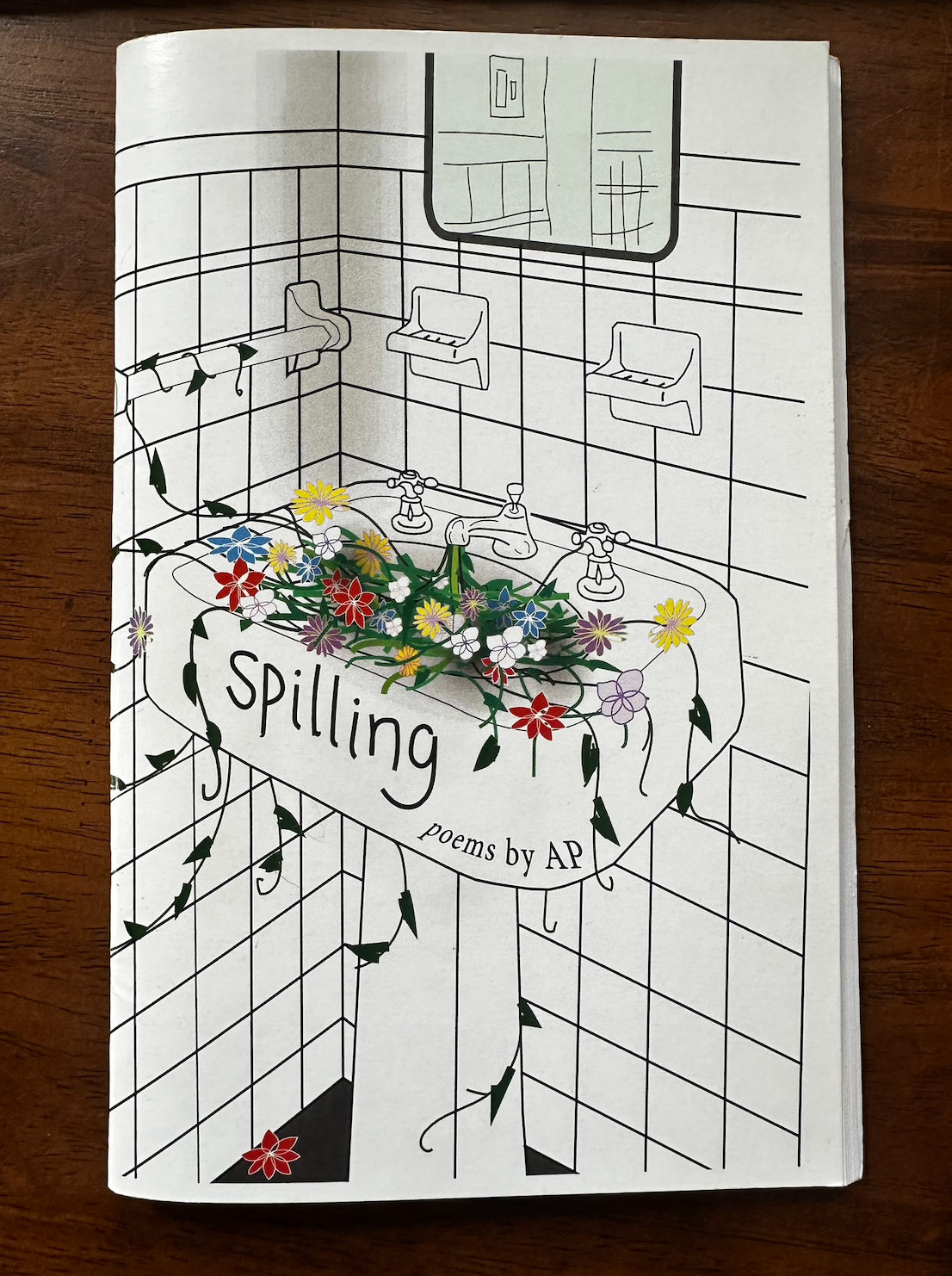
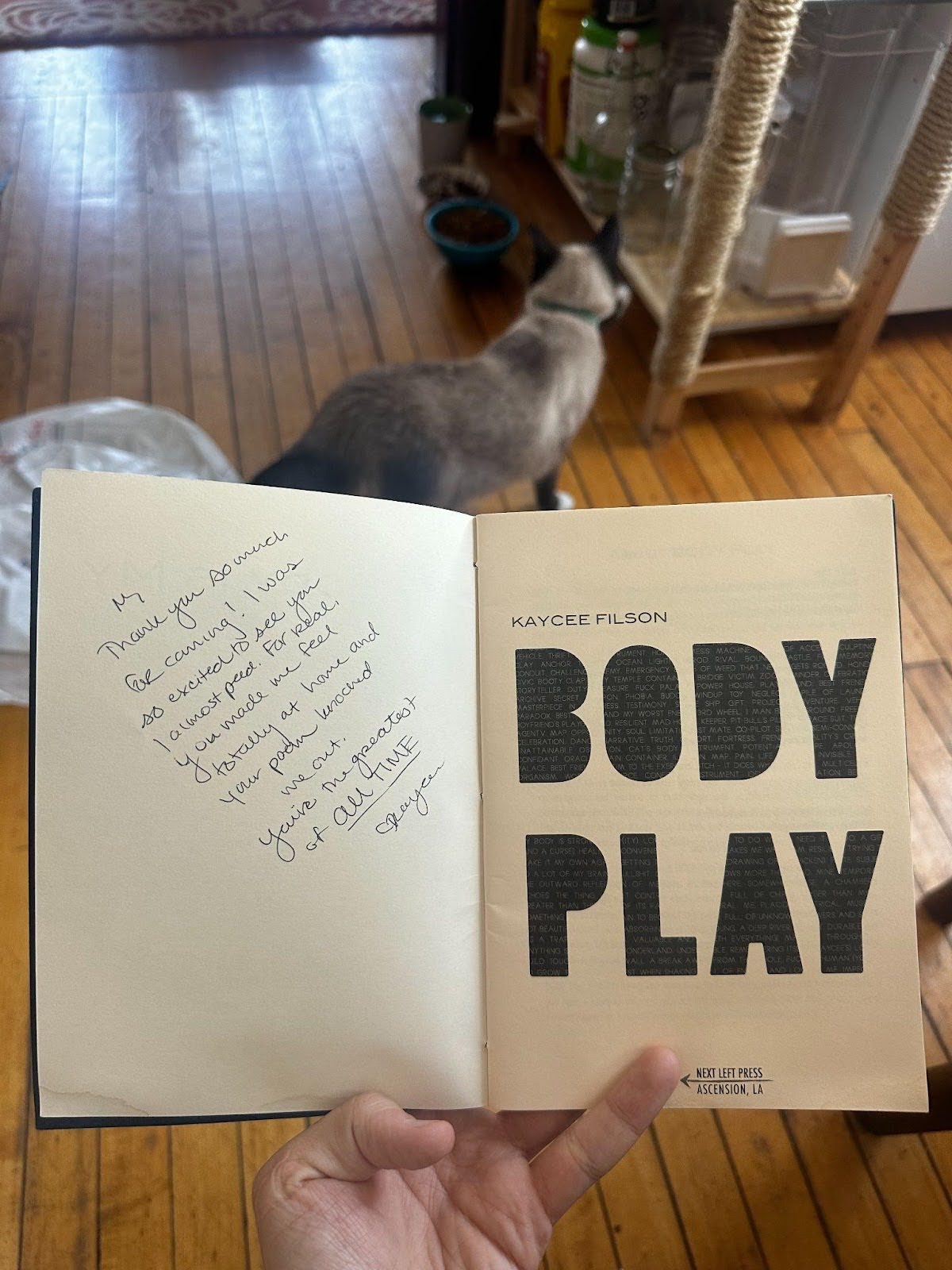
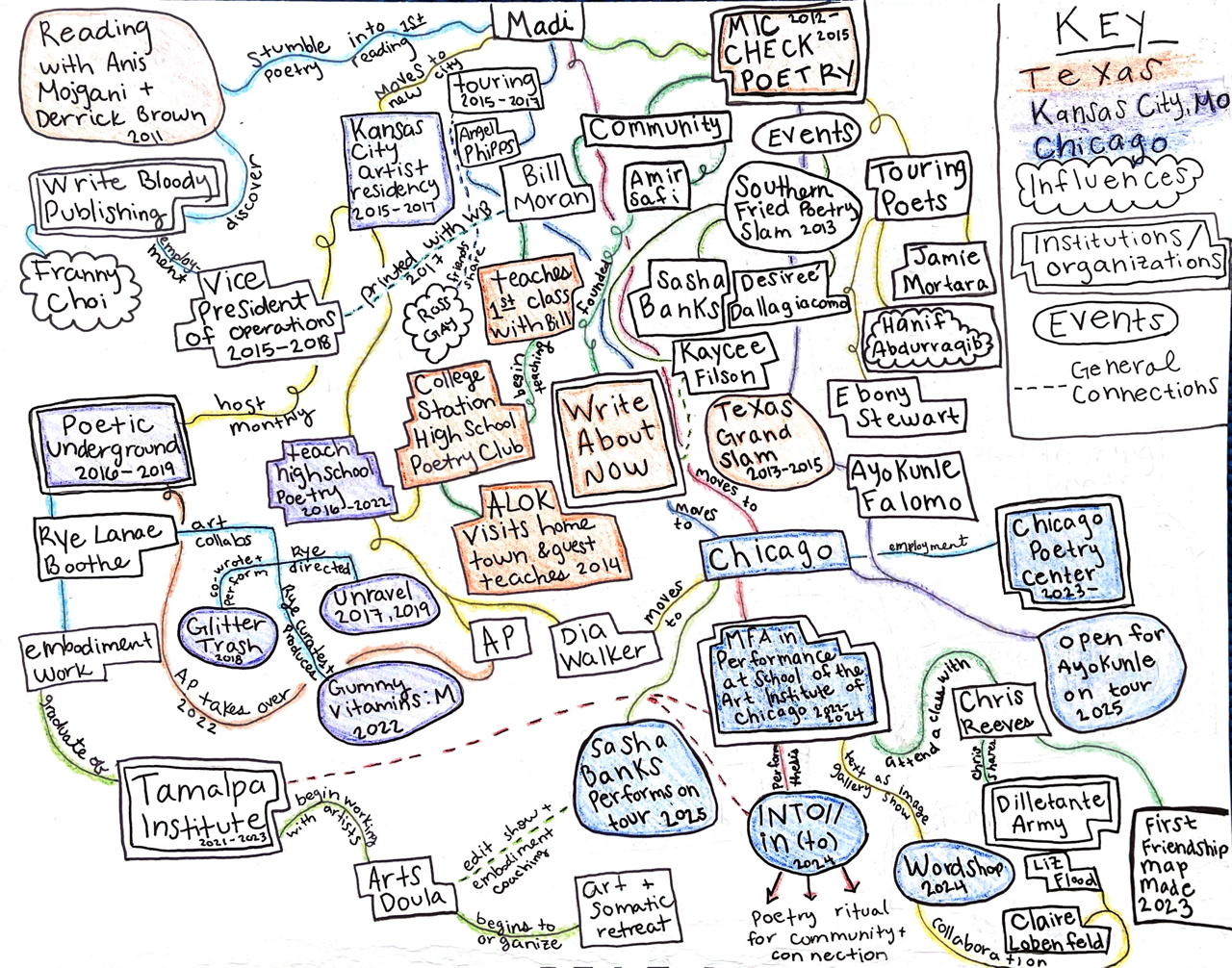
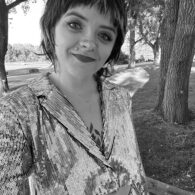
Dilettante Mail
Get updates from us a few times a year.